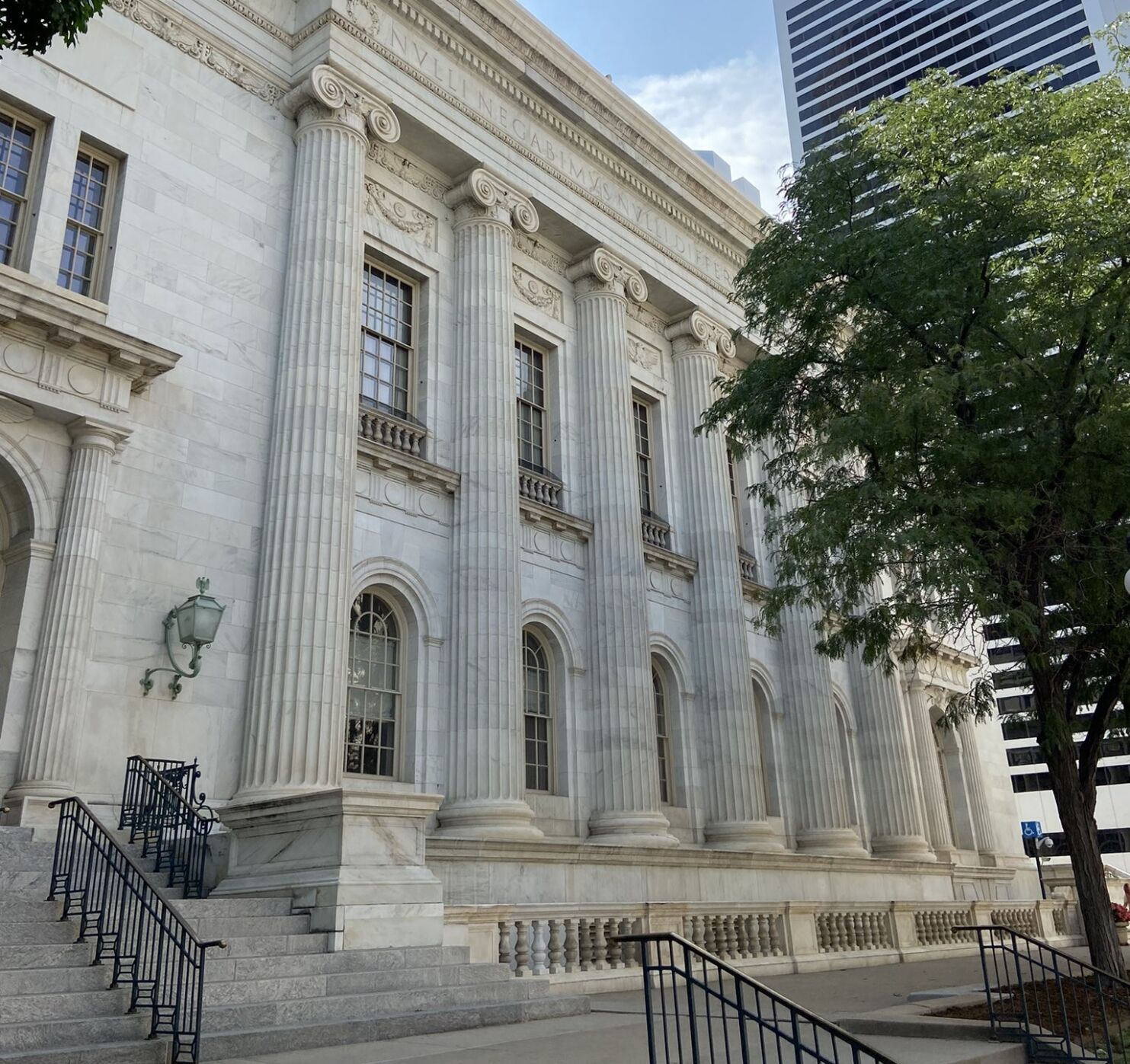10th Circuit reinstates Denver attorney’s challenge to protection order law

A Denver attorney will be able to challenge the constitutionality of Colorado’s law governing civil protection orders, which shield protected parties from stalking and harassment, the federal appeals court based in Denver ruled on Wednesday.
Regina T. Drexler became subject to a permanent protection order in 2015 after a judge believed it was necessary to prevent her from further tormenting her former friend. For the next seven years, Drexler challenged the underlying decision – even asking the U.S. Supreme Court to review her case – in an attempt to be released from the order’s terms.
She has now achieved a partial victory before a three-judge panel of the U.S. Court of Appeals for the 10th Circuit, which held that Drexler can mount a challenge to the constitutionality of Colorado’s protection order framework, which she claims is vague and overbroad to the point of interfering with her protected First Amendment rights.
But the panel declined to take action on the protection order itself, and found no indication the directive served to unconstitutionally stifle her expression.
“The protection order itself didn’t say anything that would restrict Ms. Drexler’s right to speech,” wrote Judge Robert E. Bacharach in the Nov. 30 order. A state judge who previously upheld the order said as much, which “eliminates any conceivable characterization of the protection order as a restriction.”
Despite the green light to proceed in the trial court, Drexler has faced skepticism and outright condemnation from prior judges who reviewed the facts of her case. Some of them even accused Drexler of using the judicial system to continue seeing the person she was prohibited from contacting.
Drexler and Rachel Brown were friends who had a one-time intimate encounter in 2008. But Brown sought to end the friendship. In 2015, both women filed for civil protection orders against each other, and a judge ended up granting a permanent order protecting Brown from Drexler.
During that time, the women advanced differing narratives about who was the abuser and who was the victim. Evidence from Brown showed that in 2009, Drexler came to her house, grabbed her and attempted to force her way into Brown’s home. Drexler received messages to cease and desist, but she continued to remain a part of Brown’s life.
Drexler went to Brown’s gym. Despite being an attorney, she enrolled in an architecture class at the University of Colorado Denver – where Brown was teaching. She published nonfiction, autobiographical essays about herself, in which she described sleeping with a character named “Rachel.” In all, Brown told the court Drexler was “manufacturing circumstances to gain access” to her.
Drexler countered that her essays were protected speech. She said she went to Brown’s gym at the invitation of a friend and enrolled at CU Denver independently of Brown’s teaching. Drexler wrote that it was she who had been “encouraged to seek court protection for years” from Brown.
After considering the facts, County Court Presiding Judge Theresa Spahn believed Brown deserved to be protected from Drexler.
“I think the evidence supports that you have a very unhealthy obsession and fixation on Ms. Brown,” Spahn told Drexler. “You are very calculating, you are very smart. You are very careful how you go about things. You’re smart enough not to make any direct contact, but you do whatever you can to have access to her.”
Spahn added that her decision was not about “any one isolated thing” Drexler did, including the essays about Brown. But the judge believed the pattern of behavior was abusive – including the protection order proceedings themselves.
“I really feel like you used this court and this process to once again have some sort of dysfunctional access to Ms. Brown and stir up that flurry of activity so you could be around her in a very dysfunctional way,” she said.
Drexler appealed the permanent protection order to a district court judge, who overturned the prohibition on Drexler possessing a firearm but otherwise upheld the order. Drexler further appealed to the Colorado Supreme Court and the U.S. Supreme Court, to no avail.
In November 2017, Drexler moved to dismiss the protection order. In response, County Court Judge Chelsea Malone refused to rescind it.
“Judge Spahn noted a pattern of filing and litigation used by Drexler to terrorize Brown, a pattern which continues to this day,” Malone wrote. “Drexler stalked Brown from 2008 until 2015, and has continued to seek unhealthy access to Brown through litigation of these cases.”
Once again, a Denver district court judge and the state and national Supreme Courts declined Drexler’s attempts to be released from the terms of the protection order, which now requires Drexler to stay 10 feet away from Brown and her sons.
Then Drexler filed a complaint in the federal trial court through a mechanism known as habeas corpus, which applies to people who are in custody. Drexler’s legal theory was that the protection order restrains her liberty by preventing her from continuing to publish her essays about Brown. Therefore, she is “in custody.”
“This is a novel use of habeas, I have to admit that,” her attorney, Marc J. Randazza, told Colorado Politics.
Last August, U.S. Magistrate Judge Gordon P. Gallagher recommended tossing Drexler’s lawsuit. The terms of the protection order did not place her in custody, Gallagher explained, because with limited exceptions, “she can come and go as she pleases,” unlike others who are in custody.
Gallagher further believed Drexler was unable to challenge the prohibited activities in Colorado’s protection order law – including harassment, retaliation and intimidation – which Drexler claimed were so broad and vague as to criminalize free speech. Drexler objected to Gallagher’s recommendation, but a district judge quickly adopted Gallagher’s reasoning and dismissed the case.
On appeal, Drexler continued to argue the protection order chilled her First Amendment right to write about Brown. She pointed out the Colorado Supreme Court invalidated part of the state’s law criminalizing online harassment earlier this year for being unconstitutionally broad.
“When you can be restrained from engaging in First Amendment protected speech, everybody wins if that statute is either ruled as unconstitutional as drafted or simply as applied in this way,” Randazza said.
When asked whether Brown would win if Drexler could resume writing and publishing essays about her, Randazza replied, “Gosh, I hadn’t thought about her perspective that hard.”
The 10th Circuit panel agreed with Gallagher that habeas corpus did not apply to Drexler simply because the protection order barred her from contacting Brown.
“Every year, state courts issue thousands of orders requiring parties to stay away from other individuals,” Bacharach noted. “To our knowledge, no court has ever regarded these restrictions on movement as severe enough to constitute custody.“
The panel did agree Drexler could pursue her constitutional challenge to the protection order law. In describing the protection order, the appellate judges noted the document itself contained no restrictions on Drexler’s speech rights or publication of her essays. It was a sentiment echoed by Spahn (“that’s fine, you can publish them”) and the Denver district judge who reviewed the protection order (“Nothing … prohibits Ms. Drexler from publishing written materials”).
Randazza conceded those declarations from multiple judges were “compelling” indications that Drexler would not likely face consequences for returning to her writing activities, but “at this point, she’s afraid to write. I don’t know of any American that ought to be afraid to write, no matter what.”
Attorneys for Brown did not respond to an email seeking comment.
The case is Drexler v. Spahn et al.














